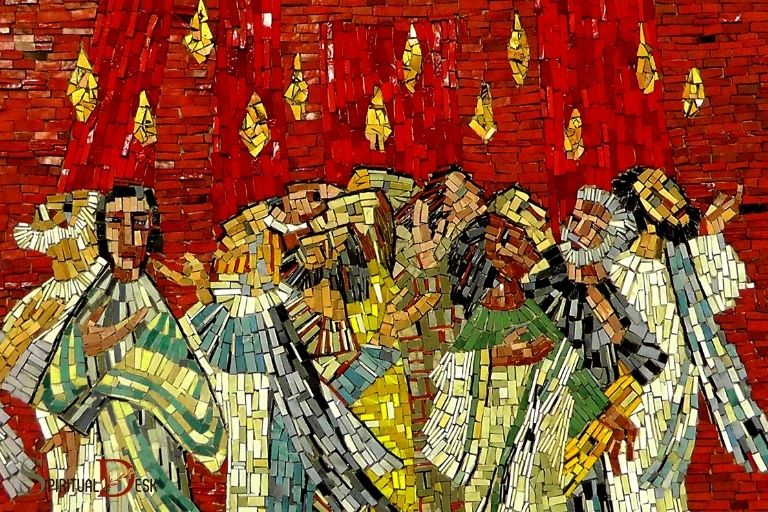What Is the Meaning And Spiritual Significance of Pentecost
Pentecost is a Christian festival that commemorates the descent of the Holy Spirit upon the apostles and followers of Jesus Christ, marking the birth of the Christian Church and its spiritual significance as the empowering force behind the spreading of the gospel.
The word Pentecost stems from the Greek term “pentekoste,” which means fiftieth. It occurs 50 days after the resurrection of Jesus Christ (Easter Sunday) and ten days after his ascension into heaven.
Pentecost is also known as Whitsunday in some traditions. This event is detailed in the New Testament of the Bible, specifically in the book of Acts, chapter 2.
On the day of Pentecost, the Holy Spirit filled the gathered followers of Christ with spiritual gifts, enabling them to speak different languages and effectively spread the gospel to people of various nations.
The spiritual significance of Pentecost lies in the transformative power of the Holy Spirit, which not only emboldened the early followers of Christ but also continues to guide and empower Christians today.
It represents the fulfillment of Jesus’ promise to send the Holy Spirit as the Comforter and Advocate to help believers grow in their faith, share the message of salvation, and strengthen the Christian
8 Aspects: Pentecost Spiritual Meaning
| Aspect | Meaning | Spiritual Significance |
|---|---|---|
| Origin | Pentecost is a Christian festival that takes place 50 days after Easter Sunday, commemorating the descent of the Holy Spirit upon the Apostles. | The event represents the fulfillment of Jesus’ promise to send the Holy Spirit to empower and guide the Apostles and the birth of the early Christian Church. |
| Biblical Account | The Book of Acts (Chapter 2) in the New Testament describes the event of Pentecost. | The account demonstrates the transformative power of the Holy Spirit and the beginning of the Apostles spreading Jesus’ teachings. |
| Name | The word “Pentecost” comes from the Greek word “Pentekost�,” which means “fiftieth.” | This name signifies the completion of the 50-day period after Jesus’ resurrection and the fulfillment of the Old Testament’s Feast of Weeks. |
| Symbols | The symbols associated with Pentecost are the dove (representing the Holy Spirit), tongues of fire, and the color red (symbolizing the Holy Spirit). | The symbols represent the divine presence, power, and guidance of the Holy Spirit in the lives of believers and the Church. |
| Feast of Weeks | Pentecost has its roots in the Jewish festival called “Shavuot” or “Feast of Weeks,” which takes place 50 days after Passover. | The connection to Shavuot emphasizes the continuity between the Old and New Testaments and the fulfillment of God’s promises throughout history. |
| Tongues of Fire | During Pentecost, the Holy Spirit descended upon the Apostles in the form of “tongues of fire,” allowing them to speak in different languages. | The miracle of speaking in different languages symbolizes the universality of the Gospel message and the unity of the Church across cultural barriers. |
| Spiritual Gifts | Pentecost highlights the role of the Holy Spirit in bestowing spiritual gifts upon believers, enabling them to serve God and others. | The gifts of the Holy Spirit empower believers to spread the Gospel, heal, prophesy, and perform various other ministries in the Church. |
| Renewal of the Church | Pentecost is often seen as a time of renewal and spiritual awakening in the life of the Church. | The celebration encourages believers to seek a deeper relationship with the Holy Spirit, renew their faith, and actively participate in the Church’s mission. |
Key Takeaway

Five Facts About Pentecost
The Origin And Meaning Of The Word ‘Pentecost’
Defining ‘Pente’
The word ‘pentecost’ is derived from the greek word �pentekoste� which means fifty. In the christian context, it refers to the celebration of the descent of the holy spirit upon jesus’ disciples, which took place fifty days after the resurrection of christ.
The Significance Of ‘Fiftieth’
The fiftieth day after the resurrection of christ is significant as it symbolizes the completion of the seven-week journey the disciples took after jesus’ resurrection.
They were instructed to wait in jerusalem until the holy spirit descended upon them. On the fiftieth day after jesus’ resurrection, the holy spirit descended, and the disciples received the gifts of the spirit.
Tracing The Evolution Of Pentecost Across Traditions
Pentecost is celebrated across various faith traditions, including judaism and christianity. In judaism, shavuot, also known as the festival of weeks, is celebrated on the fiftieth day after passover. It commemorates the giving of the torah to moses on mount sinai.
Christians celebrate pentecost as the day the holy spirit descended upon the disciples of jesus.
Highlighting The Symbolism And Implications Of Pentecost
Pentecost is significant in many ways, and it holds different meanings for different individuals.
Here are some of the symbolism and implications of pentecost:
- The holy spirit’s descent on the disciples was a sign of the fulfillment of god’s promise for redemption and salvation.
- The holy spirit empowered the disciples and enabled them to proclaim the gospel of jesus christ boldly.
- Pentecost represents the birth of the christian church and marks the beginning of a new era.
- It serves as a reminder of the importance of unity and diversity in the church and the need to work together to spread the message of christ.
Overall, pentecost is a significant event in both judaism and christianity. It has deep spiritual significance, and it is a moment for christians to reflect on the importance of the holy spirit in their lives.
Pentecost In The Old Testament: Understanding Its Foundation
Pentecost is a significant event in christian history, as it marks the day when the holy spirit descended upon the apostles and followers of jesus christ.
This event is celebrated by the faithful 50 days after easter. However, pentecost has an old testament foundation, and its roots trace back to jewish traditions.
We’ll explore the meaning and spiritual significance of pentecost, with a particular focus on its historical roots in the hebrew bible.
Contextualizing The Book Of Exodus In Relation To Pentecost
In the book of exodus, god liberates the israelites from slavery in egypt and leads them to mount sinai.
The mountain is a significant location in jewish history, as it is where god gave the ten commandments to moses. On the day of pentecost, god spoke to moses on mount sinai, and the israelites received the law of god.
This event was a crucial moment in the establishment of the jewish religion.
- God spoke to moses on mount sinai on the day of pentecost.
- The israelites received the law of god on this day.
- The event on pentecost was a momentous occasion in the foundation of judaism.
Tracing The Pentecostal Roots To Harvest Festival Celebrations
In jewish tradition, pentecost is also known as the feast of weeks or shavuot. This harvest festival celebrated the end of the wheat harvest and the beginning of the fruit harvest.
During this time, jewish people made pilgrimages to jerusalem to offer firstfruits of the harvest to god at the temple.
This practice highlights the importance of gratitude and remembrance in jewish tradition.
- Pentecost is also known as the feast of weeks or shavuot in jewish tradition.
- The festival celebrated the end of the wheat harvest and the beginning of the fruit harvest.
- Jewish people made pilgrimages to offer firstfruits of the harvest to god at the temple.
The Spiritual And Social Implications Of Celebrating Pentecost
Celebrating pentecost has both spiritual and social implications. In the christian faith, it is a celebration of the holy spirit’s descent upon the apostles and the birth of the church.
It symbolizes the unification of all believers and the start of a new era in christian history.
Additionally, the practice of gratitude and remembrance associated with pentecost serves as a reminder of the importance of community and generosity.
- Pentecost is a celebration of the holy spirit’s descent upon the apostles and the birth of the church.
- It symbolizes unification of all believers and a new era in christian history.
- The practice of gratitude and remembrance associated with pentecost reminds us of the importance of community and generosity.
The meaning and spiritual significance of pentecost are profound, and its roots are essential in understanding its historical and religious context.
By recalling the history and traditions that have shaped this celebration, we can deepen our connection to the holy spirit and gain a better understanding of our relationship with god.
Pentecost In The New Testament: Experiencing The Power Of The Holy Spirit
Pentecost is one of the most meaningful and spiritually significant events for christians worldwide.
This festival signifies the descent of the holy spirit on the apostles and followers of jesus christ, which took place 50 days after his resurrection.
Narrating The Events Of Pentecost In The Book Of Acts
The book of acts narrates the events of pentecost when the apostles and other followers of jesus gathered in jerusalem.
Suddenly, they were filled with the holy spirit, and tongues of fire appeared above their heads. They started speaking in different languages, and everyone present heard them in their native language.
This event astonished onlookers, who were amazed at the apostles’ ability to speak in their languages.
Examining Peter’S Message As A Philosophical Framework For Pentecost
Peter’s message during pentecost offers a philosophical framework for reflecting on this significant event.
He stated that the holy spirit was the fulfillment of the prophecy from the book of joel. He then tied that prophecy to jesus christ, who was the son of god and the savior of the world.
Peter’s message emphasizes how jesus’ death, resurrection, and ascension fulfilled the prophecies of the old testament, and how the holy spirit was a crucial component of that fulfillment.
Some of the key points to note in peter’s message include:
- The significance of pentecost in the context of jewish history and the role of prophecy
- The importance of jesus’ resurrection and ascension for christians
- The role of the holy spirit in fulfilling prophecy and empowering believers
- The need for repentance and baptism as essential steps for receiving the holy spirit
Unpacking The Spiritual Implications Of The Pentecost Experience
The pentecost experience has significant spiritual implications for christians. It is a reminder of the power of the holy spirit to unite people from diverse backgrounds and languages.
This event highlights the holy spirit’s role in empowering believers to share the gospel and to live out their faith courageously.
Some of the key spiritual implications of the pentecost experience include:
- The holy spirit as the source of power and inspiration for christians
- The importance of diversity and unity in the christian community
- The role of the holy spirit in spreading the gospel
- The need for believers to be filled with the holy spirit to live out their faith boldly and courageously
Analyzing The Impact Of Pentecost On Early Christianity
The impact of pentecost on early christianity cannot be overstated. This significant event empowered early christians to spread the gospel message throughout the known world, leading to the establishment of the christian church.
Key points to note regarding the impact of pentecost on early christianity include:
- The holy spirit’s role in empowering early christians to spread the gospel
- The establishment of the christian church, based on the teachings of jesus christ and the power of the holy spirit
- The continued importance of pentecost in the christian calendar and its significance as a reminder of the holy spirit’s power and presence in the christian church
Pentecost is a profound symbol of the holy spirit’s power in the christian faith. This festival serves as a reminder of the holy spirit’s role in uniting people, spreading the gospel message, and empowering believers to live out their faith boldly and courageously.
As christians, we celebrate pentecost as a significant event in our faith, and we continue to seek the guidance and inspiration of the holy spirit as we live out our lives in service to god and others.
Pentecost Beyond The Bible: Global Celebration And Emerging Trends
Pentecost is a significant christian festival and an essential aspect of christianity. This event, which occurred 50 days after easter, marks the descent of the holy spirit upon the disciples of jesus christ.
However, the spiritual significance of pentecost spreads beyond christianity, and the occasion’s popularity transcends geographical boundaries.
Here’s a look at the global celebration and emerging trends of pentecost.
Tracing The Global Spread Of The Pentecostal Movement
- The pentecostal movement began in the united states in the early 20th century and spread worldwide.
- The movement emphasizes the direct personal experience of god through the holy spirit, including speaking in tongues, divine healing, and prophecy.
- Today, pentecostals worldwide number over 600 million, making them one of the fastest-growing religious groups.
Examining The Role Of Pentecost In Non-Christian Religions And Cultures
- Pentecost does not limit its influence to christianity alone but has penetrated other religions and cultures.
- Pentecost practices with an emphasis on the holy spirit are present in some african traditional religions, hinduism, islam, and buddhism.
Exploring The Emerging Trends And Debates Around Pentecost
- One emerging trend of pentecost is the involvement of millennials in the movement.
- The rise of social media has brought pentecostal worship to smartphones and gadgets, creating an online pentecostal culture.
- Theological debates concerning the origin of pentecostalism, the role of the holy spirit and the gifts of the spirit have emerged and continue to shape the movement’s discourse.
Pentecost marks a significant event in christianity but has also spread its influence beyond the bible. Its global celebration and emerging trends make pentecost an essential aspect of contemporary religious practices.
Pentecost And Its Relevance Today: Living In The Power Of The Holy Spirit
Pentecost, also known as the jewish feast of weeks, is a significant event in the christian calendar. It marks the descent of the holy spirit upon jesus christ’s disciples and other followers, as documented in the bible in the book of acts.
Over the years, pentecost was often overlooked in comparison to other major christian festivals, but this is slowly changing. Today, pentecost carries great spiritual significance for christians worldwide.
Understanding The Contemporary Relevance Of Pentecost
Pentecost remains relevant in contemporary times. The following are the key points to note on the topic:
- The holy spirit is an ever-present entity in every christian’s life, and pentecost offers an opportunity to celebrate that.
- It is a reminder to christians that, as they live their daily lives, they should depend on the holy spirit to guide and nurture them.
- Pentecost reminds christians that god’s love and blessing are available to everyone, regardless of their race or nationality.
Highlighting The Importance Of The Holy Spirit In Modern Christianity
The holy spirit is central to modern christianity, and its importance cannot be overstated.
The following are the key points:
- The holy spirit is responsible for inspiring, empowering, and guiding christians in all aspects of life, including faith, decision-making, and witnessing.
- Through the holy spirit, christians can have a deep sense of peace, comfort, and assurance in their faith.
- The holy spirit brings unity and peace among christians, despite their diverse backgrounds and beliefs.
Examining Pentecostalism In Relation To Other Contemporary Christian Movements
Pentecostalism is a distinct christian movement that finds its roots in pentecost.
The following are the key points:
- Pentecostalism focuses on the holy spirit’s work in a christian’s life, including spiritual gifts such as speaking in tongues, prophecy, and healing.
- Pentecostalism differs from mainstream christianity in its emphasis on revival, miracles, and the direct experience of god’s power.
- Though pentecostalism has experienced tremendous growth in recent years, it is not without controversy, with critics expressing concern over some of the movement’s extreme and unorthodox practices.
Analysing The Implications Of The Pentecost Experience To Contemporary Social, Cultural, And Political Issues
Pentecost has significant implications for contemporary social, cultural, and political issues.
The following are the key points:
- Pentecost’s message of inclusivity and unity can inspire christians to work towards promoting social justice, equality, and reconciliation in society.
- The holy spirit’s empowering and transformative work can give hope and healing to individuals who struggle with issues such as addiction, mental health, and brokenness.
- Pentecost’s celebration of diversity and multiculturalism can positively impact contemporary political discourse, promoting compassion, tolerance, and understanding.
Pentecost carries great significance for christians today. It reminds us of the holy spirit’s work in our lives and the importance of depending on it.
Pentecostalism and its unique beliefs need attention, and the event’s message of inclusivity and unity can positively impact contemporary social, cultural, and political issues.
FAQ On What Is The Meaning And Spiritual Significance Of Pentecost
What Is Pentecost?
Pentecost is a christian festival celebrated 50 days after easter sunday, commemorating the descent of the holy spirit upon the apostles.
What Is The Spiritual Significance Of Pentecost?
Pentecost is significant because it represents the birth of the christian church and the presence of the holy spirit in the world.
How Do Christians Celebrate Pentecost?
Christians celebrate pentecost with special church services, prayers, hymns, and the reading of the bible scripture relating to the event.
Why Is The Holy Spirit Important In Pentecost?
The holy spirit is important because it is believed to have empowered and inspired the apostles to spread the message of christianity throughout the world.
Conclusion
Therefore, pentecost holds immense significance for christians as it symbolizes the arrival of the holy spirit and marks the birth of the church.
The day also represents unity, harmony and oneness of the community as people come together to celebrate the festival.
Christians across the globe celebrate this day with great enthusiasm and spirit, honoring the legacy of christ and his teachings. Pentecost is not just an event or festival, but a way of life that teaches us to be kind, compassionate, selfless and loyal.
It is a reminder of our duties and responsibilities towards our fellow beings and society. The occasion teaches us to be humble and lead our lives with righteousness and dignity.
It is an opportunity to immerse oneself in the love and grace of the almighty and to seek his blessings to lead a life filled with faith, hope and love.






